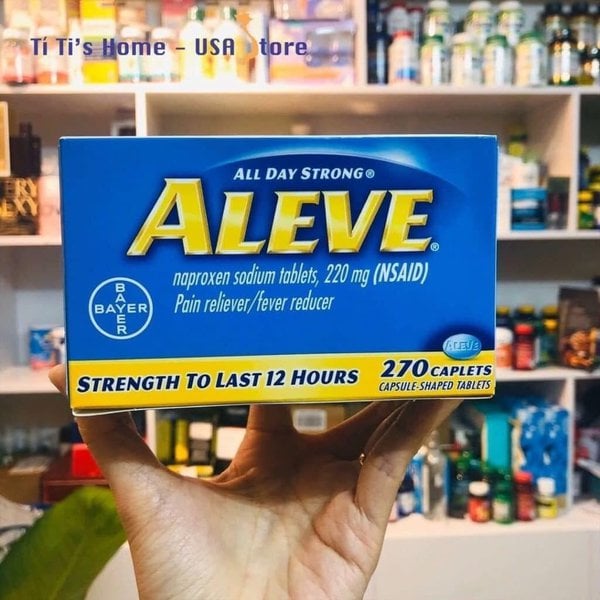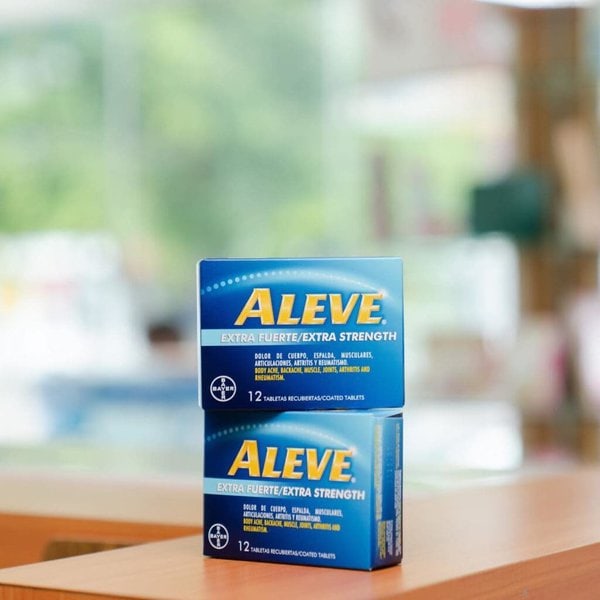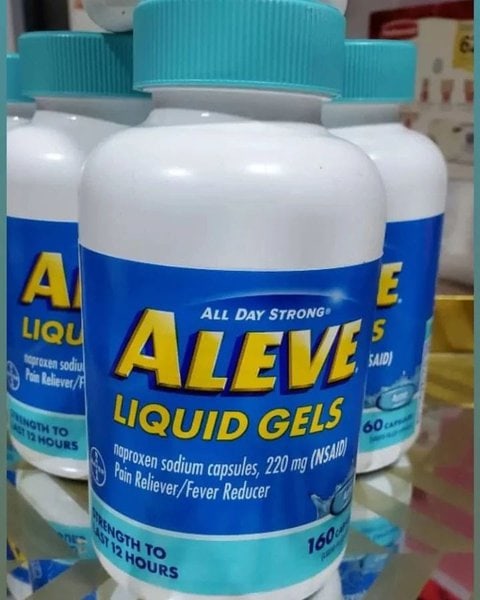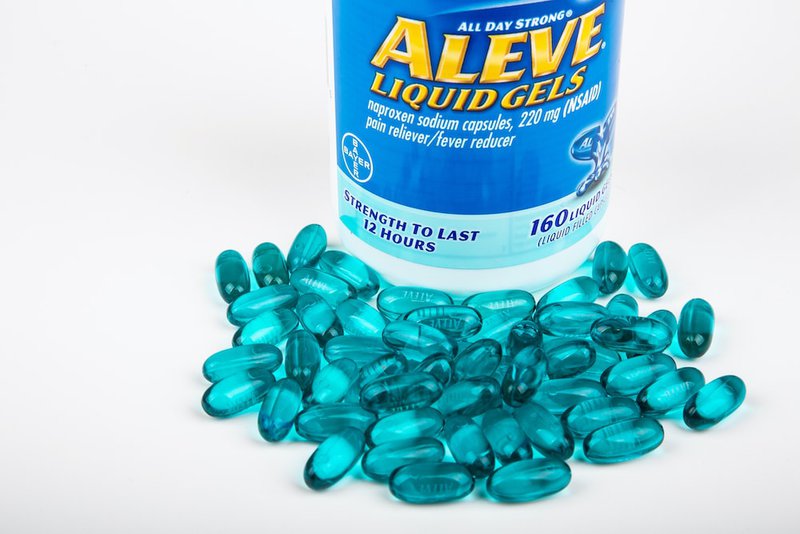My canine has been battling with osteoarthritis for quite a while. This medical condition has been causing a lot of pain for my dog and me. A close buddy then suggested giving my dog Aleve to reduce the pain. Then I wondered, can dogs take Aleve? Is it safe for them?
No, Aleve is not safe for dogs to take. This medication can damage the kidney and cause gastrointestinal problems for your canine. A small dose of Aleve can be life-threatening for your dog. So, under no circumstances should you give your dog Aleve.
One of the common health complications of giving Aleve to your dog is gastrointestinal bleeding. We urge you to keep reading this article to know more about the adverse effects of giving Aleve to your dog. Before we dive right into these effects, let’s discuss how safe it is to give dogs Aleve.
Is Aleve Safe For My Dog?

No, Aleve is extremely toxic for dogs. A small dose of Aleve can cause awful side effects for your canine.
Aleve was formerly prescribed for dogs having a severe form of arthritis. But experts later came to know about its toxicity for dogs.
If your canine is experiencing any form of debilitating pain, take it to the veterinarian for proper diagnosis. Don’t attempt to give Aleve to your dog without a vet prescribing it.
However, if every other pain killer is not bringing relief to your dog, vets sometimes prescribe very low doses to dogs. For Aleve, there’s a thin line between a safe dose and a deadly dose.
Does Aleve Make Dogs Sleepy?
Yes. Weakness and lethargy are the two most common side effects often experienced by dogs.
If you mistakenly give Aleve to your pup, weakness, and lethargy are some of the side effects you can expect. These side effects are common and similar to the other type of NSAIDs’ reactions in dogs.
How Long Does It Take For Aleve To Affect Dogs?
It takes about 30 minutes to 3 hours for Aleve to be fully absorbed into the bloodstream of dogs.
If your pet dog accidentally swallows a pill of Aleve, it will start feeling the side effects within 2 to 24 hours. The severity of the side effects would often depend on the dosage.
Older dogs with weakened kidney function are more at risk of side effects. If your pup accidentally swallows Aleve, you need to act fast by taking it to the nearest vet clinic.
What Is Safe To Give Dogs For Joint Pain?
Nonsteroidal anti-inflammatory drugs (NSAIDs) are generally prescribed for dogs suffering from joint pains. Medications such as Galliprant, Carprofen, and Meloxicam are the safest options.
Aleve falls under the category of NSAIDs medication. But it is only suitable for human consumption, not dogs. NSAIDs work by reducing inflammation in painful areas of the body.
Instead of using pain killers, you can take your dog for intramuscular injection by Adequan, an FDA-approved injection that helps with joint pain.
Before administering any medication to your pup, make sure to consult your veterinarian for proper guidance.
What Happens If A Dog Takes Aleve?

When a dog ingests Aleve, it causes severe abdominal perforation, which leads to gastrointestinal ulcers. Acute kidney failure is also one of the major signs.
Apart from the symptoms mentioned above, other serious symptoms include:
If you notice any of the above signs in your pup, do not delay in taking your dog to the vet or call the pet poison helpline.
For dogs, stomach ulcers will typically occur at a dose of 2.5 mg per pound. Kidney failure occurs at a dose of 7 mg per pound.
To prevent accidental naproxen ingestion, make sure to keep every medication out of reach of your dog.
Can You Give Dogs Aleve Or Tylenol?
No. Do not give either Aleve or Tylenol to dogs except under the direction of a veterinarian.
Aleve and Tylenol are both over-the-counter medications that are specifically made for human consumption, not pets.
Aleve is quite different from Tylenol. The former is an NSAID, whereas the latter is Acetaminophen. Both medications should be given under the guidance of a vet.
Speak to your vet if you are not sure a certain pain medication is suitable for your canine.
Will An Aleve Hurt A Dog?
Yes. A single pill of Aleve can cause severe kidney damage and gastrointestinal bleeding for dogs, ultimately leading to death.
Research has shown that most pet poisonings are caused by medications meant for people. Dogs and cats are the two most common victims.
To prevent the above situation from happening, always keep medications out of reach of your pup.
If your dog has severe arthritis, examples of common medicinal herbs you can use include the following:
Can A Dog Recover From Naproxen Poisoning?
A dog can make a complete recovery after naproxen (Aleve) poisoning if quality medical treatment is given to the dog. But there is always a risk of kidney failure.
Aleve poisoning treatment is based on the severity of the condition. If the ingestion of Aleve by your pup is recent, you can offer it activated charcoal to neutralize the toxin.
If your canine is admitted into a veterinary hospital for stomach ulcers, intravenous fluids will be administered.
If your dog is discovered to be anemic from profuse gastrointestinal bleeding, blood transfusions should be given to your dog.
Furthermore, if your dog is discovered to have stomach perforations, abdominal surgery would have to be performed to get rid of the perforation.
How Much Aleve Can You Give A Dog?
The dose commonly given to dogs ranges from 0.5 to 1.5 mg per pound once daily. A veterinarian should only administer this form of medication.
Naproxen is a drug commonly sold under the brand name Aleve®. Do not give this medication to your canine if it has kidney or liver disorders.
Aleve is also contraindicated for dogs with stomach ulcers. Aleve is also known to interact with medications such as aspirin and corticosteroids.
All in all, Aleve is rarely prescribed for dogs due to its toxic effects.
How Does Aleve Work In Dogs?
Aleve works by inhibiting the effects of pain-reducing enzymes, thereby decreasing inflammation and pain.
Aleve belongs to the NSAIDs group of drugs. Veterinarians often prescribe NSAIDs to dogs with severe forms of arthritis or joint pain.
When Aleve is given to a dog, it blocks the production of prostaglandins. Prostaglandins are often released by a dog’s body in response to injury or trauma.
When dogs take NSAIDs, the side effects are often felt in their digestive tracts. The drug mainly affects the kidney and the liver.

How Is Naproxen Poisoning Treated In Dogs?
The treatment of naproxen poisoning includes induced vomiting, use of activated charcoal, rehydration, and monitoring of renal and liver function.
A veterinarian will have to properly diagnose your dog before treatment can commence. Diagnosis involves testing the blood and urine samples in the laboratory.
The vet would also take a detailed history of your dog’s recent medications. If overdose is suspected, your dog will administer drugs to induce vomiting.
Intravenous fluids would be given to your dog to ensure balanced electrolytes. Your pup would likely be admitted to the veterinary hospital for 3 to 4 days for proper care.
How Do I Store Aleve?
Store Aleve in a sturdy and closed container away from direct sunlight, moisture, and heat.
Since Aleve is very toxic to your canine, you should make sure it’s properly kept to prevent accidental ingestion by your dog.
Never store your personal medications together with the medications meant for your pet in the same space or cabinet. This would prevent the accidental giving of human medications to your pup.
Furthermore, do not keep the container in an area of the house that your canine can easily access.
If your canine accidentally ingests Aleve, do not hesitate to call the pet poison helpline.





